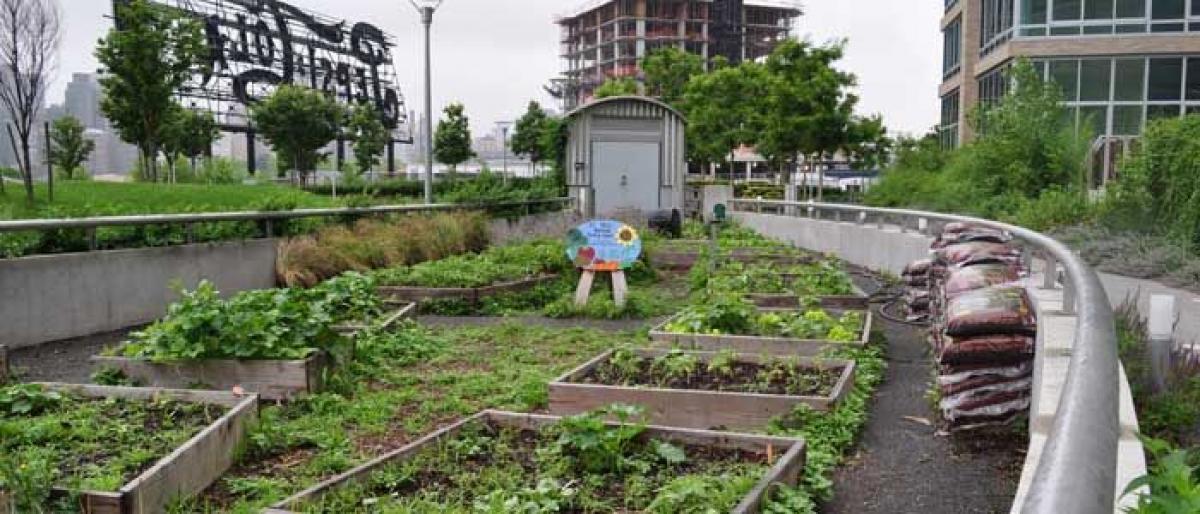Live
- CPI Centenary Celebrations: Flag hoisting held at 32 locations in EG dist
- Congress on plans 'Save Constitution' drive
- Deep sea mission in early 2026
- Police arrest 3 persons over body parcel to family
- Medical camp held in Maoist area
- CM Cup 2024: Telangana Gears Up for State-Level Sports Fest
- Bandi stresses dedicated efforts for uplifting backward areas
- CPI Marks 100 Years of Revolutionary Struggles for Social Justice
- Demand to provide jobs to Srisailam project displaced
- Safeguarding Justice: Advocates Protest Court Relocation in Gadwal
Just In

Lack of awareness and apprehensions of water leakages, which might damage the buildings, are hindering the State governments ambitious scheme to encourage people grow vegetables on rooftop and kitchen gardens
Hyderabad: Lack of awareness and apprehensions of water leakages, which might damage the buildings, are hindering the State government’s ambitious scheme to encourage people grow vegetables on rooftop and kitchen gardens.
According to sources in the State Horticulture department, out of 635 sq.km of the Greater Hyderabad Municipal Corporation (GHMC) area, nearly 60 sq.km has the potential for urban farming.
Speaking to The Hans India, a senior official said that there are nearly 22 lakh houses and apartments in the GHMC area. “In area wise, people can cultivate vegetables in about 16,000 acres, which roughly translates to about 60 sq.km. But, as of now, only 40,000 households are engaged in the rooftop and kitchen garden cultivation, merely in around 100 acres. This is less than a square kilometre area,” he added.
However, S Rao, ex-president of the Saket Colony, Kapra finds that low awareness about the scheme among people is failing the urban farming in his colony with around 800 individual houses. Taking a different view, Sampath, secretary of the Residents Welfare Association (RWA), Jaipuri Colony in Hayathnagar stressed on consensus among residents.
“Residents should first think about how to share vegetables among them as terrace is a common area and secondly, those residing on the top floor would have to coaxed as they would be apprehensive about possible water leakages which might weaken the slab,” he pointed out. Voicing similar view, GS Rao said, “The Saket Shreyam in our area has two towers, one with 25 and another with 14 floors. Then, how to share the vegetables grown on the terrace among about 250 residents is an issue,” he said.
Palla Sankar Rao, president of Padmavathi Colony in LB Nagar and Niranjan Reddy, secretary of Snehanagar Colony, in Uppal too hold a similar view that pushing the scheme from the government side without proper awareness would not help it succeed. They suggested holding awareness and training camps in every residential colony in the city.
In Vayupuri Colony, it was a different story. Most of the residents here are retired defence personnel in the age group of around 79 and above years whose children are abroad and they are interested in the scheme. But, it would be difficult to take up a new commitment for them said the president of the RWA, T J Reddy. He said, “Almost every residential house in the area has a space ranging from 150 to 200 square yards available to cultivate vegetables.
But, who should look after them is the issue,” he said. Adding, people from the Horticulture department had organised an awareness and training camp in which 300 people participated. “In our colony, around 20 people are practicing urban farming. If there is any mechanism like roping in school students, volunteers of National Service Scheme (NSS) and the like to oversee it, then, it is sure to happen. And, those implementing urban farming need to identify different issues coming in the way of its implementation and address the same to make it a big success. Because, people are indeed interested in it,” he said.

© 2024 Hyderabad Media House Limited/The Hans India. All rights reserved. Powered by hocalwire.com







